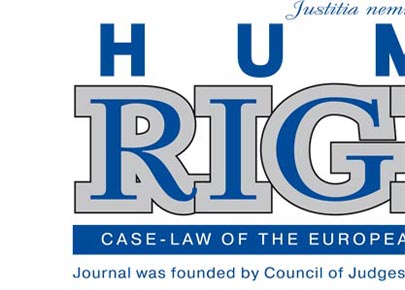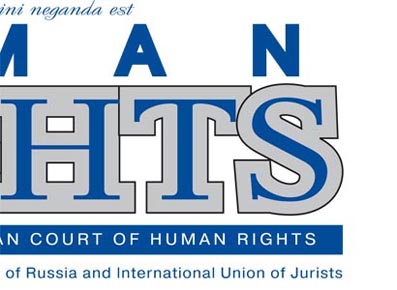
‚Ñ? (12)
Mme Veronika V. Milinchuk was appointed as the Representative of the
Russian Federation before the European Court of Human Rights by the
Decree of the Russian Federation President No. 371, 20 March 2007. The
event will be covered in more detail in the next issue of the journal. We are
confident that the roles of Russia in the European human rights mechanism
will expand.
The 8th of March was the anniversary date in the life of Mr Andrey A.
Trebkov: he was celebrating his 70th birthday. Mr Andrey A. Trebkov is the
President of the international non-governmental association ¬´International
Union of Jurists», which is a co-founder of our journal, and he is a member
of the Editorial Council of the ¬´Human Rights. Case-Law of the European
Court of Human Rights» Journal. The Editorial Council, Editorial Board
and all employees of the journal most cordially greet Mr Andrey A. Trebkov
on the occasion of his anniversary birthday.
The issue of the journal is mostly about the supervisory review proceedings
in Russia’s courts. We open the discussion on the subject by publishing
the latest legal material in Russian and in English (the latter being aimed
at our foreign readers, of course) and articles by eminent Russian jurists,
Mr Boris Ya. Polonskiy and Mr Nikolay M. Kipnis, on the issue of the
supervisory review proceedings.
The approach of the European Court of Human Rights to the issue is
based on its case-law and seems to be a radical one. The European Court
does not take into consideration the special characteristics of the judicial
system of the Russian Federation, which had been formed considering the
size of the country, its multinational and very large population and the
latter’s uneven allocation in the territory of the State.
In fact, allegations of the European Court as regards the supervisory
review proceedings in the Russia’s judicial system concern the issues that
are not settled by the European Court itself yet.
The ancients used to say: nemo index in propria causa est. However,
how can judges who took prior decisions to revise a case and refer it to the
Grand Chamber be involved in the hearing before the Grand Chamber?
But this is what Rules of Court envisage, as of today.
The supervisory review proceedings in Russia’s courts do need certain
reforming. This was noted by the judgment of the Russian Federation
Constitutional Court of 5 February 2007. In any case, renouncement of the
supervisory review proceedings in Russia would have become pernicious
for her judicial system. The reforming should be considerate, adjusted and
well-weighed.
Case-law of the European Court, considering particularities of the life,
should not be a dogma, as it sometimes appears in the practice of the
European Court. An approach of the Court should also transform, as the
things develop and necessary corrections are made.
We hope that our readers, both Russian and foreign, including judges of
the European Court, would suggest their ideas on the issue on the pages of
our journal.
Vitaly Portnov
 Back
Back
Content 



